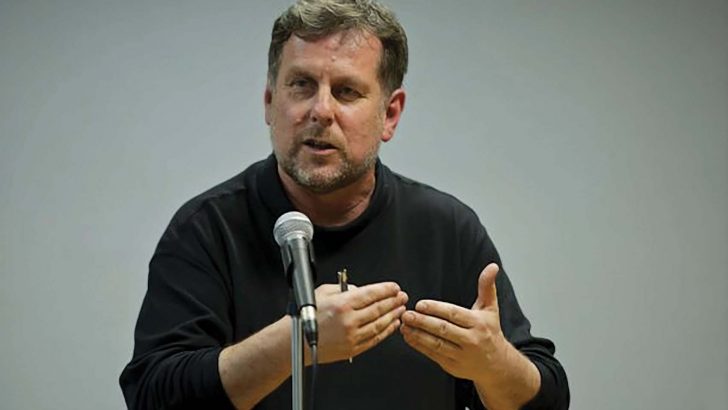Personal Profile
A generation of philosophers, sociologists, and public intellectuals wrote off religion, declaring that we were moving into a secular age where faith would be redundant. But as Dr Michael Kirwan SJ, new director of the Loyola Institute in Trinity College Dublin (TCD), points out, this hasn’t happened. In fact, Dr Kirwan explains, many philosophers now think that we are moving into a “post-secular age”.
“Even people who are not particularly religious are finding that they need to know about religious and religious traditions,” Dr Kirwan tells The Irish Catholic. “We had a very interesting event on religious literacy at the beginning of last year. If society is to survive, to flourish, then it needs to know its religious traditions and it’s not helpful if people are ignorant about religion.
“Even among secular philosophers, there’s a huge turn towards an interest in religion because people are saying that societies over time cannot survive without something like religion – for example, truth,” he continues. “The last Irish census said that 78% of people in Ireland self-identify as Roman Catholic. That’s an astonishing figure when you think of what’s going on in the last 20 years.
“Now, that figure is declining and it’s up to us to understand what these people mean by being Catholic. But given the chance, they’re saying, ‘I consider myself a Catholic’. So tell me it is a secular society when 78% are saying that somehow they relate to a religious tradition.”
Experience
Dr Kirwan has extensive experience in this area having taught pastoral and systematic theology for more than 20 years. He taught first in Heythrop college, a specialist Jesuit college in the University of London, and now in TCD. Coming to Ireland in 2020 brings Dr Kirwan a full circle, in a certain sense. Both his parents were devout Catholics from the West of Ireland. Partly as a result of their influence, faith has always been important to Dr Kirwan.
“My mum – she’s still around, she’s 92 – and she’s a very devoted committed Catholic,” Dr Kirwan explains. ”It was a believing household. I probably went through a little spell of agnosticism around mid-teens, but otherwise I’ve been pretty much committed.”
Dr Kirwan went to school at a Jesuit school in Leeds, a fact which was to have a great baring on his future. Though there weren’t many Jesuits present, just two chaplains, their example later convinced him to join the Jesuits. However, though a committed Catholic right through his teens, Dr Kirwan says his vocation to the priesthood took him completely by surprise.
“I was doing my final exams at university when this thing suddenly sprung on me,” he says. “It was a time of anxiety, uncertainty – a kind of, what am I going to do with my life? But this wasn’t at the forefront of my thinking at all. It happened very, very quickly from the end of my studies to entering the Jesuit novitiate. It was about a six month period, it was very, very great – it was just extraordinary.”
In 1980, Dr Kirwan joined the novitiate and spent the next few years studying to become a Jesuit priest. From 1990-1993, he was assistant parish priest in Corpus Christi parish, Brixton Hill, South London. He enjoyed the experience immensely.
“I wasn’t thinking at that stage of doing further studies,” Dr Kirwan explains. “I knew that when I was ordained, I’d have to spend time in a parish. I really enjoyed it, it’s great parish in South London there. It had a little bit of everything – it was socially mixed, racially mixed, it’s a very interesting part of London.”
Following his three years in the parish, Dr Kirwan was informed by his superiors that they would like him to do further studies. He spent the next four years working on a PhD, before taking up a full-time position in Heythrop College. He never forgot his years working as a priest and believes the experience was invaluable in shaping his approach to studying theology.
“Obviously my giving a lecture I’m doing something of what Christ was doing, helping people to know God better,” Dr Kirwan says. “To help people get that, whether you do that on a Sunday morning or in a lecture hall. You’re trying to set up first this God thing, what does it mean there being God. In a lecture you’ve got two hours to do that. But on a Sunday morning you’ve got 7-10 minutes. But I think there’s a link there.”
Dr Kirwan’s latest role is that of Director of the Loyola Institute, a mission that he’s looking forward to enormously and has high hopes for.
“It’s got enormous potential,” he says. “There’s a lot of reorganisation going on about the school of religion. That’s been reorganised the last couple of years and how the Loyola Institute fits into that is under discussion. There’s still a lot of things to be decided around all that. It’s a very interesting place to be and of course it’s a class university and I think it’s very good, very important to be there.”


 Ruadhán Jones
Ruadhán Jones